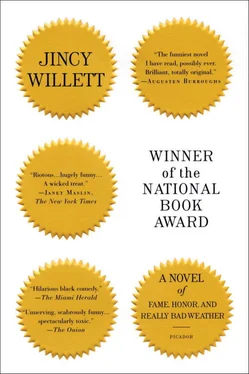Rocco had brought us a case of Spam, two jars of yellow mustard, two boxes of cream-filled chocolate cupcakes, at least a hundred packages of peanut butter cheese crackers, and, sloshing in the bottom of the bag, a million packets of grape Kool-Aid with which to wash it all down. That night we dined like kings, the old kings, the ones who ate meat with their hands, and we regaled one another with tales of the strange lands from which we had journeyed, Hopkinton and Olneyville, Chepachet and Attleboro, and the singular quests which had brought us to this hospitable place. With the exception of the Lincoln couple, retirees returning from a stay with their daughter’s family in Stonington, we were all working people, on the road to deliver auto parts and office supplies and olive oil, or on our way home from early closings. There was a schoolteacher, a hairdresser, a dental hygienist, and an insurance salesman (who assured us, chuckling, as we registered alarm, that he was off duty for the evening). There were two hunters on their day off. Some of us, including me, never revealed their occupations, and none of us exchanged full names, but we were good company that night. And later, bedding down on a hardwood floor, nestled snugly between a civics teacher and somebody named Bev, I slept more profoundly than I had in weeks.
And awoke the next morning to snow, snow, and snow. Breakfast was not quite as jolly as dinner had been, although most of us were still in a positive mood. We spent the first half of the morning trying to open the front door so that the men could go out and scavenge. High winds had blown a drift of epic proportions against the entire storefront, and the rear door was also unmanageable. Mid-morning the men left, smartly attired by Rocco in the latest Eskimo gear. We didn’t see them again for more than two hours, the length of time it took them to locate the convenience store, which had effectively disappeared, and burrow into it. “You can all forget about your cars. You’re never going to find them again,” they announced upon their return, as they dumped on counter and floor every edible and semi-edible thing they had been able to find, including a frozen-solid block of saugies, five gallons of rainbow sherbet, a gross of spearmint gum packets, and a giant box of Bisquick.
We stared blankly at our comestible future, and then one of the women started laughing, triggering a tension-releasing group laugh, except that the woman who had started it kept going and seemed for a while unable to stop, and after she finally did a pall settled over us, and we went our separate ways to ponder our plight, which wasn’t easy in a single twelve-by-fifteen room. Rocco assured us all that we’d be okay, it couldn’t snow forever, and besides he had plenty of heating fuel, and if we were still here tomorrow ( “If,” snorted two of the men) he’d break out his homemade jerky, of which he had an inexhaustible supply.
This triggered a run on the phone, as it occurred simultaneously to all of us to worry about the heating fuel status of our loved ones. It took me an hour to get through to Anna, because the phone lines were tied up statewide, but when I did she assured me that we’d had an oil delivery two days before, and she had plenty of stuff to eat. When I elaborated upon where I was, she laughed herself into hiccups. “Poor Dorcas,” she said, “no place to hide and not a book in sight.”
I asked her to call her mother, and then I hung up. Poor Dorcas. I didn’t like the sound of that, especially coming from my girl. And I really hadn’t needed reminding that there was nothing to read. For the rest of that dreary day I made a library out of Rocco’s Famous Sport & Trophy, and to this day I can remember the address, down to the very zip code, of the factory in Worcester where his trophies were made, and the banal cover designs on each of his catalogues, and all six recipes on the back of the Bisquick box. The others exchanged life stories, commiserated about local politics, cursed the ancestry of all snow-removal personnel, while I studied Rocco’s inventory list, read up on duck blind construction, and committed to memory “The Saga of Acme Quoits,” which, to my sorrow, was only a mimeographed page and a half long. Late in the afternoon I was overjoyed to discover a pornographic paperback hidden in the bathroom behind the toweling and soap supplies. It was titled Full Frontal Funhouse, an odd choice for text-only, and the plot wasn’t much, but just the heft of the book, the reassuring orderly march of words across the page, was enough to soothe me, and I only regretted having to read it in the bathroom.
So I was in decent spirits when the telephone rang shortly after supper (saugies off a hotplate: really delicious) and it was Anna, and she was worried about Abigail. “Mother sounds funny,” she said.
I hadn’t given Abigail an extended thought since the blizzard began. “In what way funny?”
“I don’t know. She says she’s okay but I don’t believe it. She kept telling me she loved me. She never does that.”
“Just please tell me exactly what she said.”
“I called her, and the phone rang and rang, and when she picked it up, or he did, there was this clunking sound like it was dropped on the floor, and then somebody hung up. I called right back and he answered, right away, and he thought it was you. He said, ‘Dorcas?’ And when I told him I wanted to speak to Mother he just dropped the phone, and after a while she was on the line. She started crying. She said she was a bad mother, because she hadn’t called to see how I was, and you know, she never does that. It took me a while to calm her down. Then she said everything was just fine. Which is bullshit. I’m sorry, Dorcas, but that’s what it is.”
“Don’t worry,” I told Anna. “I’ll take care of it. It’ll be okay.”
“Dorcas,” Anna said, “ he wanted your number there in Ashaway. I wouldn’t give it to him.”
When I put the phone down everybody was looking at me. “You got troubles?” asked Rocco.
No, no, I assured him, everything was perfectly fine, but I needed to make a phone call. I didn’t know how I was going to talk to my sister in such a public place, but right then everybody pretended to be engrossed in some urgent enterprise, reminding grateful me that Rhode Islanders can be, in their own odd way, the most gracious people in the world. I took a deep breath and called Watch Hill.
After ten rings he picked up. “There you are,” he said. “Whooping it up in Ash Wednesday, I hear. How’s doings? The kid said you were—”
“Put my sister on.”
“Hey, that’s kind of rude. So’s leaving without saying good-bye.”
“Put my sister on.”
“All righty.” He set the phone down. Sweetcheeks! he called, Honeybun! Your sister’s on the line!
“Dorcas?” Her voice was small and breathy.
“Tell me yes or no. Are you alone right now?”
“Yes.”
I had to believe her. “What’s happening? Anna said you weren’t yourself.”
For a full minute she just breathed. Finally she spoke so softly that I couldn’t hear her. She had to repeat herself twice until I heard: “I’m so hungry, Dorcas. I’m so goddamn hungry.”
“What?” I practically shouted into the phone. Bev, boning up on French’s mustard vinaigrette suggestions, glanced at me in alarm, then looked quickly away. “Then eat something, for God’s sake. The pantry’s full, the refrigerator too, I checked it before I left. You ought to be stuck here with me. All we’ve got here is—”
“It’s all gone. There’s nothing left.”
“What? How on earth? It’s only been twenty-four hours.”
“He’s done something with it. He’s hidden it. I can’t get out the door.”
Читать дальше












